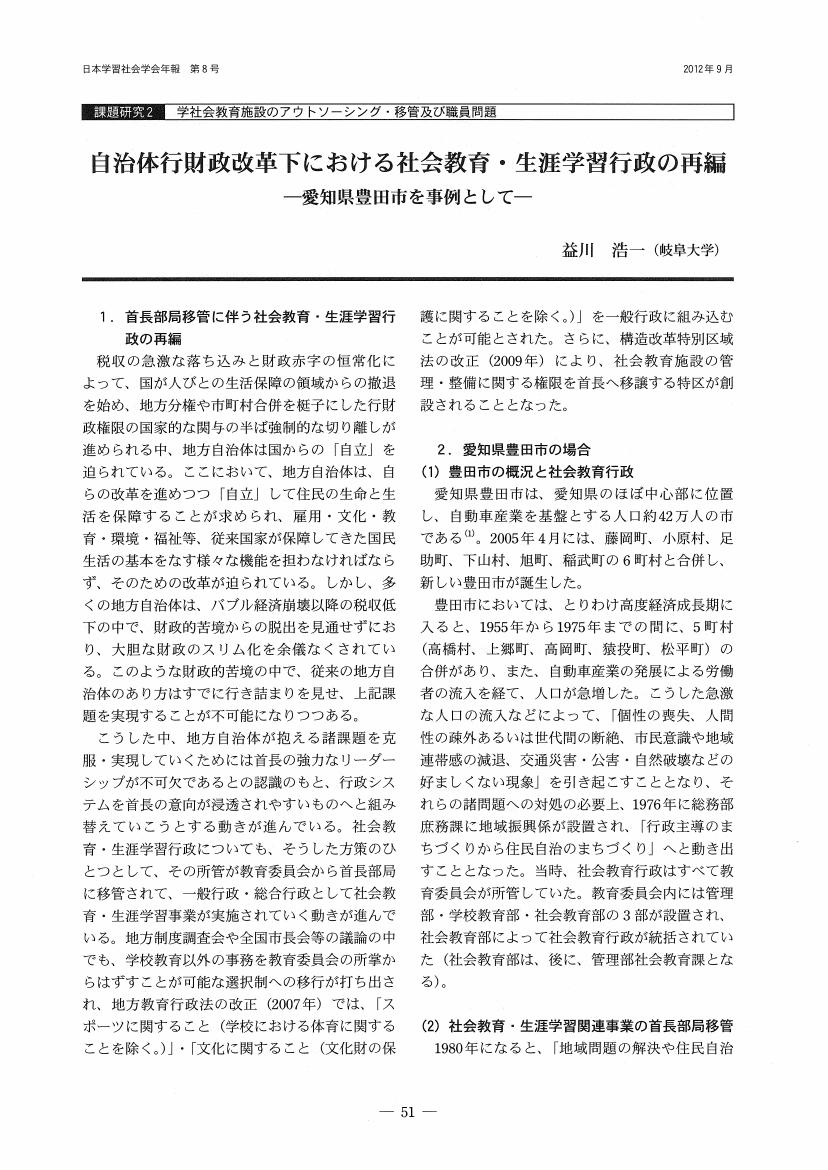2 0 0 0 OA PTA組織の設立・発展と活動の展開に関する地域史的研究 ―岐阜県内を事例として―
- 著者
- 益川 浩一
- 出版者
- 日本学習社会学会
- 雑誌
- 日本学習社会学会年報 (ISSN:18820301)
- 巻号頁・発行日
- vol.14, pp.85-94, 2018 (Released:2020-01-31)
2 0 0 0 OA 公民館再編下における学習・集会の自由と社会教育法第23条 —宗教をめぐって—
- 著者
- 益川 浩一
- 出版者
- 日本公民館学会
- 雑誌
- 日本公民館学会年報 (ISSN:1880439X)
- 巻号頁・発行日
- vol.14, pp.50-57, 2017-11-30 (Released:2019-04-04)
This paper constitutes an attempt to develop an interpretation at the general and abstract level of the text of Article 23 of Japan’s Social Education Act, which regulates “management policy for community learning centers (kominkan),” or stated in more concrete terms, so-called “usage restrictions” on community learning centers. The discussion gives particular attention to specific cases (e.g., examples in practice), in reference to the Article’s Paragraph 2, which states that such facilities “shall not support specific religions or otherwise assist any specific denominations, sects, or cults.” The following points are revealed through this discussion.Community learning centers are not permitted to “support specific religions or otherwise assist any specific denominations, sects, or cults.” Accordingly, it is understood that simply allowing such groups the use of community learning centers does not amount to “support” or “assistance,” and thus does not constitute a problem.·There are no arguments against recognizing the right of the public administration to allocate permission to use community learning centers (kominkan), and it is necessary to enact laws and regulations governing permissible and impermissible use.·When processing applications for permission to use community learning centers (kominkan), value judgements on the part of the facilities’ operators are not permitted. Rather, such operations must be performed in accordance with uniform and neutral standards (subject to the limitations of the law).·Regarding the refusal of permission for applications to use community learning centers (kominkan), the interests benefitted by granting permission, in terms of protecting fundamental human rights, such as freedom of assembly, must be compared with the interests disadvantaged by the foreseeable dangers of granting permission (balancing of interests).·Regarding the determination of dangers, the mere probability of a dangerous situation arising is insufficient; rather, there needs to be a “clear and present danger.”·Notably, constraints of spiritual freedoms like freedom of assembly must be carried out under strict criteria that go beyond constraints governing freedom of economic activity.·The blanket application of usage restrictions includes the danger of constraining “freedom of assembly” (Article 21 of the Constitution of Japan).
- 著者
- 益川 浩一
- 出版者
- 一般社団法人日本教育学会
- 雑誌
- 教育學研究 (ISSN:03873161)
- 巻号頁・発行日
- vol.78, no.1, pp.1-10, 2011-03-31
本稿は、現在設置されている法人公民館のひとつである岐阜県多治見市の財団法人池田町屋公民館を事例として、法人公民館の設立・運営の実態を歴史的に明らかにすることを目的とする。池田町屋公民館の設立にあたっては、1947年の政令第15号によりこれまでの区(部落会)では保有できなくなった山林等の区有財産の処理をめぐって、いわば区有財産保持・管理の「隠れみの」として法人立の公民館が設立された経緯が明らかとなった。また、戦後初期における財団法人池田町屋公民館においては、生産復興・産業指導・医療・福祉・保健・生活改善等、郷土社会の復興や人びとの生活福祉に関する活動が多彩に繰り広げられた実態が明らかとなった。
1 0 0 0 OA 自治体行期政改革下における社会教育・生涯学習行政の再編 ―愛知県豊田市を事例として―
- 著者
- 益川 浩一
- 出版者
- 日本学習社会学会
- 雑誌
- 日本学習社会学会年報 (ISSN:18820301)
- 巻号頁・発行日
- vol.8, pp.51-55, 2012 (Released:2019-09-09)
1 0 0 0 韓国ソウルにおける「マウル共同体総合支援センター」の現状と課題
- 著者
- 松尾 有美 森田 政裕 益川 浩一
- 出版者
- 岐阜大学
- 雑誌
- 岐阜大学総合情報メディアセンター生涯学習システム開発研究 (ISSN:13491652)
- 巻号頁・発行日
- vol.13, no.1, pp.45-78, 2014
- 著者
- 益川 浩一
- 出版者
- 日本学習社会学会
- 雑誌
- 日本学習社会学会年報 (ISSN:18820301)
- 巻号頁・発行日
- no.8, pp.51-55, 2012-09
- 著者
- 益川 浩一
- 出版者
- 日本学習社会学会
- 雑誌
- 日本学習社会学会年報 (ISSN:18820301)
- 巻号頁・発行日
- vol.8, pp.51-55, 2012


